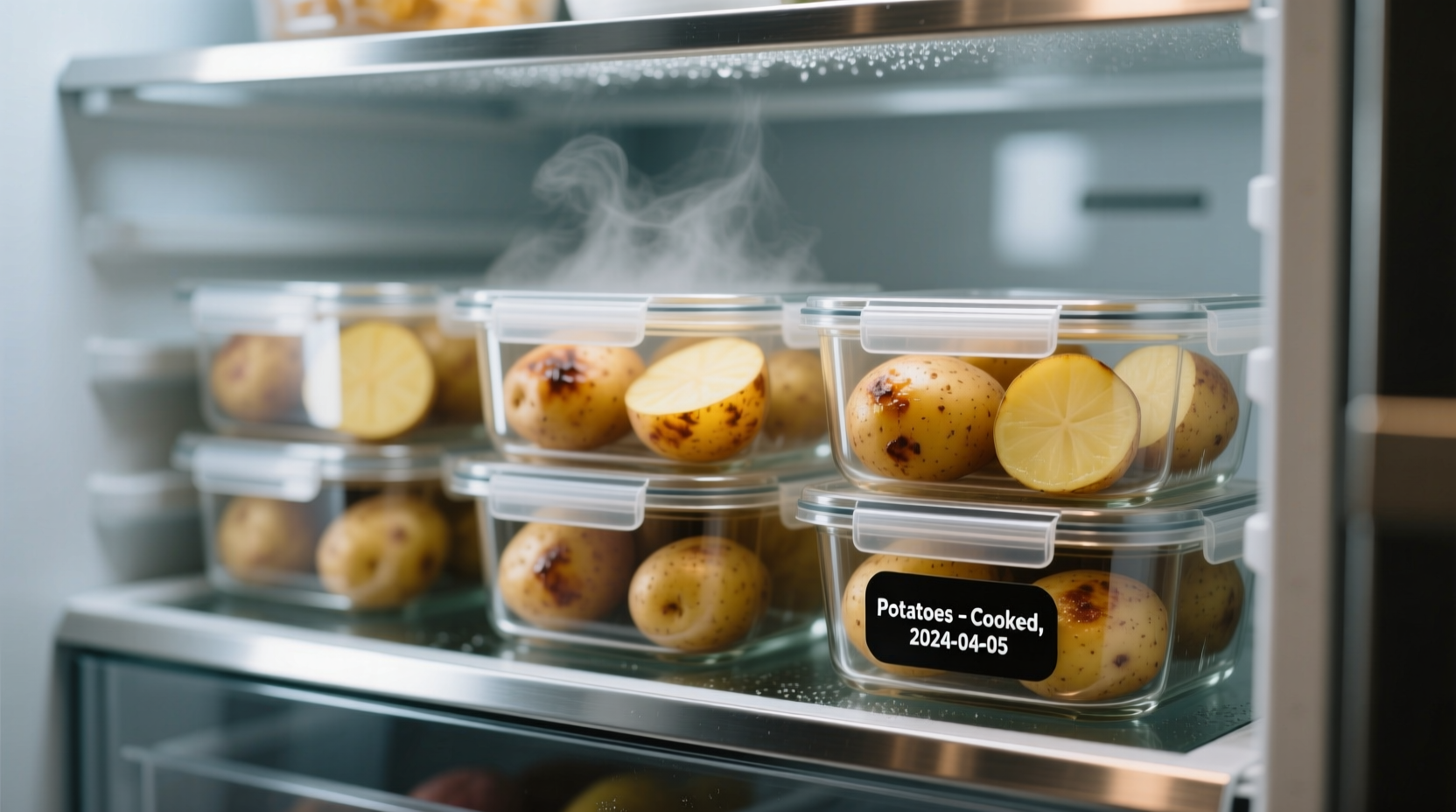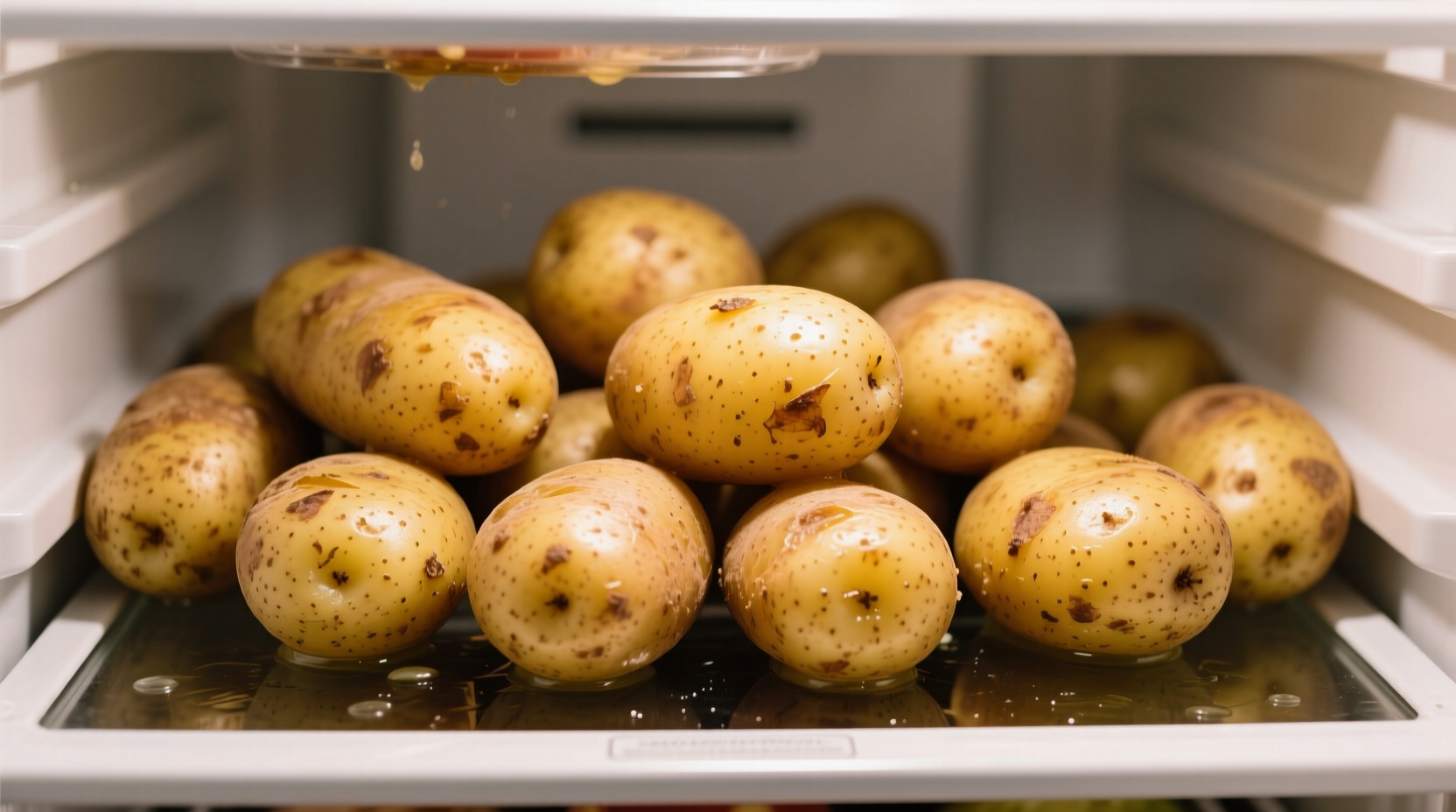Cooked potatoes stay safe to eat in the refrigerator for 3-5 days when stored properly at or below 40°F (4°C). This timeframe applies to boiled, roasted, mashed, or baked potatoes stored in airtight containers.
Discover exactly how to maximize freshness, recognize spoilage signs, and safely extend your cooked potatoes' shelf life. This guide delivers science-backed storage guidelines from food safety experts—no guesswork required.
The Science-Backed Storage Timeline for Cooked Potatoes
Understanding the precise window for cooked potato safety prevents both food waste and potential illness. According to the USDA Food Safety and Inspection Service, cooked potatoes enter the "danger zone" (40°F-140°F) where bacteria multiply rapidly after 2 hours at room temperature.
| Potato Preparation | Refrigerator Shelf Life | Freezer Shelf Life |
|---|---|---|
| Boiled or steamed | 3-5 days | 10-12 months |
| Mashed potatoes | 3-4 days | 10-12 months |
| Riced potatoes | 3 days | 6-8 months |
| Roasted or baked | 4-5 days | 6-8 months |
This comprehensive timeline from FoodSafety.gov reflects how preparation method affects storage duration. Mashed and riced potatoes have shorter shelf lives due to increased surface area and moisture content that accelerates bacterial growth.
Maximizing Freshness: Your Step-by-Step Storage Protocol
Follow these evidence-based steps to achieve the maximum 5-day refrigerator shelf life for your cooked potatoes:
- Cool rapidly: Spread potatoes in a single layer on a baking sheet to cool within 2 hours after cooking. Never place hot potatoes directly in sealed containers.
- Use proper containers: Transfer cooled potatoes to airtight containers or resealable bags with minimal air. Glass containers with tight-fitting lids maintain quality better than plastic.
- Label everything: Note the storage date on containers. The National Center for Home Food Preservation recommends this simple practice to prevent accidental consumption beyond safe limits.
- Store strategically: Place containers on refrigerator shelves rather than in the door where temperature fluctuates with frequent opening.

Spoilage Detection: Beyond the Clock
While the 3-5 day rule provides a safety baseline, always inspect potatoes before consumption. The FDA Food Code emphasizes that visual and sensory cues often indicate spoilage before the expiration date:
- Texture changes: Slimy surface or mushy consistency indicates bacterial growth
- Odor development: Sour or unpleasant smells signal spoilage
- Visual indicators: Mold growth (fuzzy spots in various colors) or unusual discoloration
- Taste test (last resort): Off-flavors mean immediate disposal
When in doubt, throw it out. Foodborne illness from improperly stored potatoes typically stems from Staphylococcus aureus or Bacillus cereus bacteria that produce heat-resistant toxins unaffected by reheating.
Extending Shelf Life: Freezing Techniques That Work
Freezing cooked potatoes properly extends their usability significantly. Follow these professional techniques:
- Pre-freeze method: Spread cooled potato pieces on a parchment-lined baking sheet, freeze for 2 hours, then transfer to freezer bags. This prevents clumping.
- Freezer container selection: Use rigid containers with 1/2 inch headspace for expansion or heavy-duty freezer bags with air removed.
- Labeling protocol: Include both storage date and preparation method (e.g., "mashed, 2% milk, butter").
- Thawing best practices: Transfer to refrigerator 24 hours before use. Never thaw at room temperature.
For mashed potatoes specifically, adding a small amount of cream or butter before freezing creates a protective barrier against freezer burn. The University of Minnesota Extension confirms properly frozen cooked potatoes maintain quality for 10-12 months.
Special Considerations for Different Potato Dishes
Not all potato preparations follow the standard timeline. Consider these specific scenarios:
- Potato salad: Contains mayonnaise which accelerates spoilage. Consume within 3-4 days.
- Cream-based dishes: Potatoes in soups or stews with dairy last only 3-4 days regardless of potato content.
- Oil-coated potatoes: Roasted potatoes with olive oil maintain quality slightly longer (up to 5 days) due to oil's preservative properties.
- Herb-infused potatoes: Fresh herbs shorten shelf life to 3 days while dried herbs have minimal impact.
Remember that mixed dishes are only as fresh as their most perishable ingredient. Always follow the shortest recommended storage time among components.
Food Safety First: Why These Guidelines Matter
Adhering to proper storage timelines prevents foodborne illness while reducing waste. The Centers for Disease Control estimates 48 million Americans get sick from foodborne illnesses annually. Potatoes themselves aren't high-risk, but cooked starches create ideal conditions for bacterial growth when mishandled.
Following these evidence-based storage practices ensures you enjoy your potatoes safely while minimizing unnecessary waste. When stored correctly, cooked potatoes remain both safe and delicious throughout their recommended shelf life.











 浙公网安备
33010002000092号
浙公网安备
33010002000092号 浙B2-20120091-4
浙B2-20120091-4